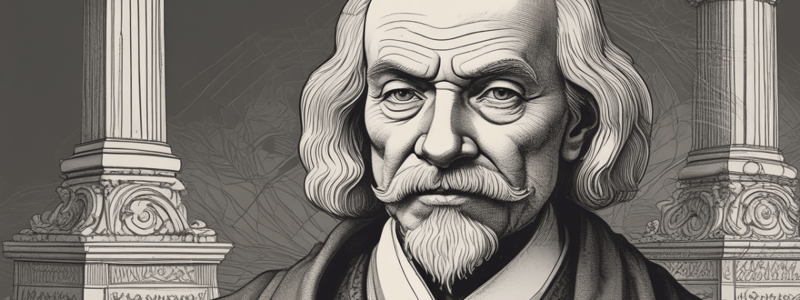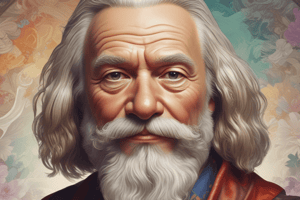Podcast
Questions and Answers
What is the primary motive in human behavior according to Thomas Hobbes?
What is the primary motive in human behavior according to Thomas Hobbes?
- The seeking of pleasure and the avoidance of pain (correct)
- The pursuit of knowledge and understanding
- The desire to help others and create a better society
- The need to conform to societal norms and expectations
What is the function of government according to Hobbes?
What is the function of government according to Hobbes?
- To provide absolute freedom to its citizens
- To protect the interests of the wealthy and powerful
- To promote the common good and ensure social justice
- To satisfy as many human needs as possible and prevent humans from fighting with each other (correct)
What is Thomas Hobbes' view on the nature of the universe?
What is Thomas Hobbes' view on the nature of the universe?
- The universe consists of both matter and spirit
- The universe consists only of matter and motion (correct)
- The universe is inherently chaotic and unpredictable
- The universe is governed by divine providence
Why did Hobbes reject Bacon's inductive method?
Why did Hobbes reject Bacon's inductive method?
What is Hobbes' view on the nature of the mind?
What is Hobbes' view on the nature of the mind?
What is Hobbes' preferred form of government?
What is Hobbes' preferred form of government?
What is Hobbes' view on human nature?
What is Hobbes' view on human nature?
What did Hobbes consider the mind to be?
What did Hobbes consider the mind to be?
What is the explanation for attention, according to Hobbes?
What is the explanation for attention, according to Hobbes?
What is the origin of dreams, according to Hobbes?
What is the origin of dreams, according to Hobbes?
What motivates human behavior, according to Hobbes?
What motivates human behavior, according to Hobbes?
What is the role of free will in Hobbes's philosophy?
What is the role of free will in Hobbes's philosophy?
How did Hobbes explain the phenomenon of trains of thought?
How did Hobbes explain the phenomenon of trains of thought?
What is the philosophical label that best describes Hobbes's view of the universe?
What is the philosophical label that best describes Hobbes's view of the universe?
What is the ultimate goal of human behavior, according to Hobbes's hedonistic theory?
What is the ultimate goal of human behavior, according to Hobbes's hedonistic theory?
Flashcards are hidden until you start studying
Study Notes
Thomas Hobbes' Philosophy
- Hobbes is considered the founder of British empiricism, believing that the primary motive in human behavior is the seeking of pleasure and the avoidance of pain.
- He believed that the function of government is to satisfy human needs and prevent humans from fighting with each other.
Materialism and Mechanism
- Hobbes believed that all human activity, including mental activity, can be reduced to atoms in motion, making him a materialist.
- He believed that the universe consists only of matter and motion, which can be understood through mechanistic principles.
- Hobbes thought that humans could be viewed as machines consisting of matter and motion.
Politics
- Hobbes' primary interest was politics, and he believed that an absolute monarchy was the best form of government.
- He believed that humans are naturally aggressive, selfish, and greedy, making democracy dangerous.
- Only under a monarch, he felt, could there be law and order.
Epistemology
- Hobbes rejected Francis Bacon's inductive method in favor of the deductive method.
- He rejected Bacon's concept of innate ideas, believing that all ideas come from experience or sensory experience.
Mind-Body Problem
- Hobbes was a physical monist, denying the existence of a nonmaterial mind.
- He believed that mental phenomena could be explained by sense experiences and internal motion.
Psychological Concepts
- Attention is explained by the fact that sense organs retain motion caused by external objects, preventing them from responding to others.
- Imagination is explained by the decay of sense impressions over time.
- Dreams are caused by the same origin as imagination, with vividness due to lack of new sensory impressions during sleep.
- Motivation is driven by appetite (seeking pleasure) and aversion (avoiding pain), following a hedonistic theory of motivation.
- There is no place for free will in Hobbes' deterministic view, with "will" being defined as the prevailing action tendency in conflicting desires.
- Trains of thought are explained by the law of contiguity, where events experienced together are remembered together and subsequently thought of together.
Studying That Suits You
Use AI to generate personalized quizzes and flashcards to suit your learning preferences.




